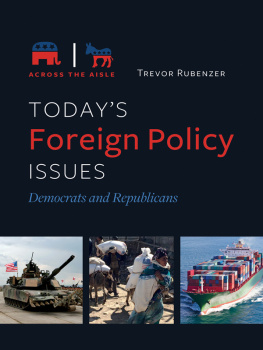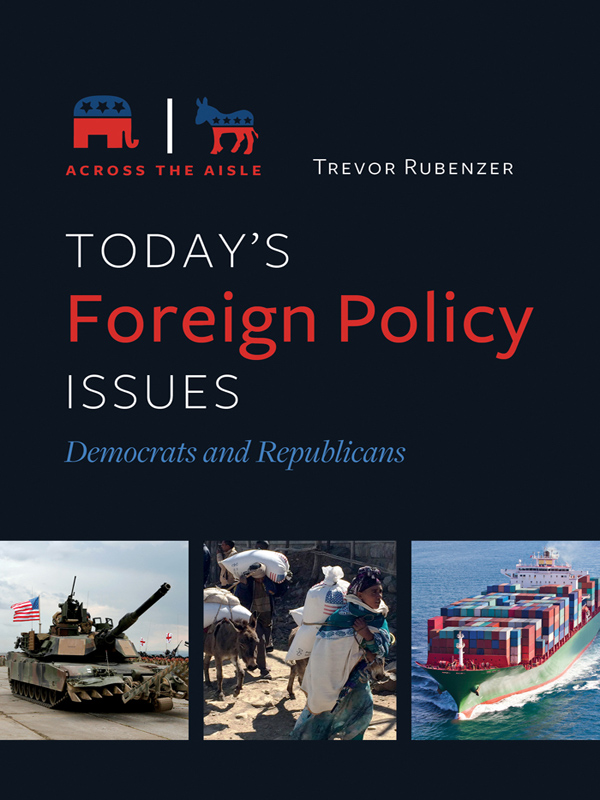Trevor Rubenzer - Todays Foreign Policy Issues: Democrats and Republicans (Across the Aisle)
Here you can read online Trevor Rubenzer - Todays Foreign Policy Issues: Democrats and Republicans (Across the Aisle) full text of the book (entire story) in english for free. Download pdf and epub, get meaning, cover and reviews about this ebook. year: 2017, publisher: ABC-CLIO, genre: Politics. Description of the work, (preface) as well as reviews are available. Best literature library LitArk.com created for fans of good reading and offers a wide selection of genres:
Romance novel
Science fiction
Adventure
Detective
Science
History
Home and family
Prose
Art
Politics
Computer
Non-fiction
Religion
Business
Children
Humor
Choose a favorite category and find really read worthwhile books. Enjoy immersion in the world of imagination, feel the emotions of the characters or learn something new for yourself, make an fascinating discovery.
- Book:Todays Foreign Policy Issues: Democrats and Republicans (Across the Aisle)
- Author:
- Publisher:ABC-CLIO
- Genre:
- Year:2017
- Rating:5 / 5
- Favourites:Add to favourites
- Your mark:
Todays Foreign Policy Issues: Democrats and Republicans (Across the Aisle): summary, description and annotation
We offer to read an annotation, description, summary or preface (depends on what the author of the book "Todays Foreign Policy Issues: Democrats and Republicans (Across the Aisle)" wrote himself). If you haven't found the necessary information about the book — write in the comments, we will try to find it.
Examines the perspectives of Democrats and Republicans on dozens of major foreign policy issues of the 21st century, illuminating both areas of consensus and issues where partisan divisions are wide.
From the earliest days of the republic through the Cold War and to the present day, American foreign policy has been colored by the beliefs and values of Americas major political parties. Surveying the breadth and depth of partisan divisions on a variety of key foreign policy issues yields a better understanding of how partisanship has helped define U.S. leadership in the modern era.
This book treats 38 individual foreign policy issues, each chosen for its timeliness and importance to American interests in the 21st century. For example, readers will learn about the partisan feelings regarding U.S. foreign policy toward Cuba that surfaced in the wake of President Obamas visit to Cuba in 2016 and his decision to resume diplomatic relations. These feelings serve as an excellent example of both partisan and intergovernmental divisions on a key U.S. foreign policy issue.
Each entry contains an historical overview that will quickly bring readers up to speed on the issue, followed by an authoritative survey of positions and statements held by presidents, key leaders of Congress, and other important voices in both the Republican and Democratic parties. The book will serve as a vital and highly accessible reference for anyoneundergraduate university students, advanced high school students, and general readerswho needs a one-stop source for information about partisanship and U.S. foreign policy.
- Presents both historical and contemporary examples of partisan divisions on key foreign policy issues that clarify the impact of partisanship on politics and foreign policy
- Examines a wide variety of partisan actors and sourcesincluding the party platform, unelected party elites and advisors, members of Congress, U.S. presidents, and presidential candidatesfor their unique perspectives on foreign policy issues
- Supplies cross-referenced coverage of related foreign policy topics, such as ISIS, Syria, Iraq, and terrorism
Trevor Rubenzer: author's other books
Who wrote Todays Foreign Policy Issues: Democrats and Republicans (Across the Aisle)? Find out the surname, the name of the author of the book and a list of all author's works by series.














